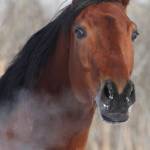Be Ready for Winter Horse Care

Days are getting shorter, nights are colder, and the first snowflakes have been seen in many parts of the country. Are you and your horses ready for winter? Think about these things to be sure you’re prepared for the coming season.
Barn. Your horses may spend more time in their stalls due to bad weather and shorter daylight hours. Walk through your barn with an eye toward anything that could cause an injury or other problem. Scan electrical wiring to be sure there are no frayed or exposed wires, and replace light bulbs if needed. Windows should be in good condition; check latches and hinges for sharp edges. Test the watering system; is it in good operating order? Are there depressions in the centers of the stalls that need to be filled? Are there gaps under stall walls or doors where a horse could catch a hoof? What about roof leaks or loose skylights? Now is the time to make repairs before winter wind, rain, and ice make the situation worse.
Pastures. Chances are, you’ll still turn your horses out on pleasant days, so walk each fence from both sides and check for loose nails, splintered boards, sharp wires, and anything else that needs attention. If gates need to be replaced or rehung, take care of this chore before the problem gets worse. Is the gate area already a mudhole? Bring in gravel, sand, or rubber chips to protect this spot, and plan to install geotextile in the spring for a more permanent fix.
Safety. The fire extinguishers in the barn and tack room may need to be serviced; does everyone in your barn know where these are and how to operate them? Do you have a supply of sand or cat litter to scatter on frozen ground so you can safely walk around the barn area? What about the batteries in your emergency flashlights? Are emergency numbers—veterinarian, farrier, police, fire department, ambulance—still posted near the barn phone? Are your name and street address clearly readable at your farm entrance?
Horse health. If your horses need vaccinations or dental work, this should be completed before winter to keep horses in good health and able to get the most out of their feed and hay. Check with your farrier about adding borium or another no-slip treatment to shoes, and ask about pads to keep snow from balling up in hooves. Consider pulling shoes for horses that won’t be in work during the winter. Be sure salt and warmer-than-icy water will always be available to every horse.
Feeding. Your winter hay is probably already stacked in the barn; each horse will need at least 1.5% of its body weight in hay or another fiber product each day. Be sure to keep enough feed to tide your horses over if bad weather prevents a trip to the feed store.
Trailer. Even if you don’t plan to travel with your horse until spring, be sure the trailer is ready to go. If it’s parked in a far corner of the barn lot, don’t block it in with other equipment; you may need to take a horse to the clinic with very little notice.








